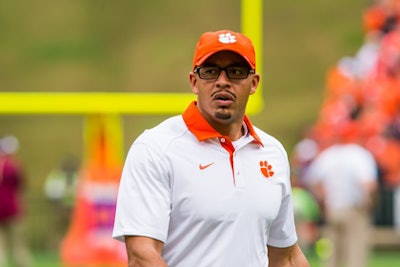 Clemson co-offensive coordinator Tony Elliot
Clemson co-offensive coordinator Tony ElliotClemson University’s Tony Elliott was once a walk-on for the team he now serves as co-offensive coordinator.
In the fall of 1999, he joined the team, then coached by Tommy Bowden. He went on to become not only a scholarship athlete, but team captain. Upon graduating with a team-best 3.55 GPA in industrial engineering in 2002, Elliott went on to pursue a career as an engineer.
A few years later, however, Elliott found himself volunteering as a coach of a local football team in Easley, South Carolina, less than 20 miles from Clemson, trying to find his true calling.
“I didn’t feel like I was fulfilling my purpose [as an engineer], and obviously football was the easiest thing to turn to,” Elliott said.
From there, the man who said he “didn’t plan on going into coaching” found himself on the coaching staff at South Carolina State University, then Furman University and, eventually, coming full circle at Clemson, where he started as running backs coach in 2006.
Elliott, who faced a tremendous amount of adversity and suffered more loss than any child should ever know growing up, has previously said that football provided an outlet for him.
“It was a way for me to channel my frustration in a positive way. Through the opportunity and relationships provided to me, I was able to realize the importance of education,” he said in an interview with ESPN earlier this year.
Now on the coaching staff at his alma mater and ascending through the ranks to more and more responsibility, Elliott said his experiences growing up have helped shape him as a person and have influenced him as a coach.
“Ultimately, your experiences and what you learned along the way help you to define your character,” he said.
“I’ve learned that the majority of my education came outside of the classroom, through social growth,” through spiritual growth and through experiential learning, Elliott said.
The people and situations Elliott encountered throughout his life “taught me a lot about how I didn’t want to be treated,” he said. And they taught him to treat people better as a result.
Among the most valuable of the lessons he carried over from his childhood, he said, was the ability to relate to players of different backgrounds and relate to the adversities in their lives. His own experiences taught him to “be empathetic to understand what they’re going through and push them to overcome.”
For Elliott, who remembers sometimes feeling like a second-class citizen, he said it is important to him to instill in players a sense of importance, a sense of belonging and a sense of purpose — a priority that is shared by head coach Dabo Swinney and the other members of the Clemson coaching staff.
“Outside of football, we always try to drive home the family atmosphere,” he said, adding that the objective is for the players to realize there is more than football, and not only is their in-game performance important, but in life after football, they should always strive for perfection, working to be the “best father, best husband, best citizen they can be.”
“Whether my guy’s a starter or he’s a third team, on the scout team, making them feel like they’re a part of the team — because they are,” Swinney said.
Surrounding the players and promoting a positive family atmosphere — one that fully embraces and encourages the success of the guys on the team as whole individuals: students, family men, eventual husbands and fathers — is critical, because with the schedule demands associated with playing Division I football, there isn’t a lot of opportunity to seek that affirmation elsewhere.
“From a time standpoint, you really don’t have much of a life outside of football,” said Elliott, who explained that in addition to the time spent actually playing the game every week, practices, conditioning, traveling for away games, and reviewing film are among other time-consuming activities that go behind maintaining a number one program.
Because of this, Elliott said, the coaches and other athletic support staff, along with other faculty and staff have a responsibility to help the players become more than just good football players, but to really help “define what type of men they’re going to be for the rest of their lives.”
It has been this emphasis by Elliott and the entire staff that has helped propel the Clemson Tigers to not only the number one slot on the field, but has put them among the top 10 percent in Academic Progress Rate statistics for each of the last five years — the only Football Bowl Subdivision institution to finish each of the last four seasons in the top 25 on the field and in the top 10 percent of APR scores in the classroom.


















